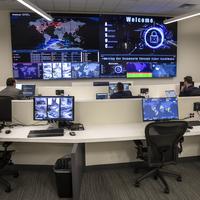As many as 30,000 people are affected with Amyotrophic Lateral Sclerosis (ALS) and there are at least 5,000 cases each year. The people most at risk are military veterans.
Dr. Richard Bedlack, a professor of neurology and founder of the Duke ALS Clinic at Duke University, says ALS is not that rare of a disease and many veterans are swiftly being killed by this complex disorder.
“It doesn’t seem to matter when or where they served, (they) are about as twice as likely to get ALS as non-veterans,” said Bedlack.
Formerly known as Lou Gehrig’s disease, ALS attacks motor neurons in the spinal cord and brain. It quickly deteriorates muscle, causing the loss of movement that ultimately leads to paralysis. What makes ALS even more complicated is that there’s no cure.
“In spite of over 100 years of research we really don’t have therapies that dramatically slow, stop or reverse this disease. We have a lot of little things that make the quality of life better for people with this disease … but we don’t have that home run we are looking for,” Bedlack said.
Because medical experts estimate the disease will continue to grow within the veteran population as a result, the Department of Veterans Affairs made ALS a service-connected illness.
Juan Reyes is a veteran of the United States Air Force. He was diagnosed with ALS in 2015, a diagnosis he says completely altered the course of his life.
“I now require the use of a wheelchair and I require assistance with daily activities, including bathing, feeding, getting dressed, etc.,” Reyes said.
Reyes served as an Air Force Medic for 21 years and also worked as a defense contractor.
“However, when the contract ended, I moved into a non-profit and worked as the executive director for the local Salvation Army command,” Reyes said.
The illness forced Reyes to retire, but he says it hasn’t permeated everything in his life.
“I am still a husband, a father, a brother, a son and those come first before ALS and they were there before,” Reyes said.
In spite of his physical limitation and constant medical appointments, Reyes is involved in many facets of advocacy and awareness which he believes keep him busy, engaged and alive.
“I have something to look forward to every day when I wake up and that is to help people understand the challenges of living with ALS and the needs that our ALS community needs,” Reyes said.
His activism and those of many whose voices have been silenced by ALS have been finally heard: President Joe Biden signed into law the “accelerating access to critical therapies for ALS ACT” on Thursday.
Reyes’ fight has been a key part in offering so many veterans battling ALS hope for effective therapies and a cure.
“I’m hopeful it gives me more time with my loved ones,” Reyes said.

